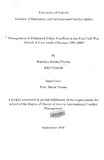| dc.description.abstract | The study found out that low satisfaction of individual human needs, physical and psychological, by the government leaves individuals and ethnic groups prone to manipulation by political elites to engage in ethnic conflicts. In manipulating members of ethnic groups and the ethnic groups as a whole, leaders persuade them to believe that the president and his ethnic group are to blame for their unsatisfied needs. This sets a stage for ethnic clash as ethnic groups rise against each other questioning the status quo. Therefore the best approach in prevention and management of politicized ethnic conflicts is through satisfaction of human needs both physical and psychological.
The study found out that the extent to which the government uses deterrence measures to crack down on reformists and quell ethnic clashes determines the potential for politicization of ethnic conflicts. By using excessive force the government plays in the hands of ethnic war lords who use violence as a way of expressing their grievances to the authority.
The study also found out that there is a positive correlation between the number of registered parties and the intensity of violence. A high number of registered political parties shows an increase in desire by political elites to use their ethnic groups as launching pads to attaining leadership. When it became clear after the first two multiparty elections (1992 and 1997) that no one ethnic group can propel one of their own to top leadership, the politics of . coalition building started. The first coalition party, National Rainbow Coalition (NARC) was launched prior the 2002 general elections. It was a grouping of political parties with each party representing an ethnic voting bloc. | en_US |

